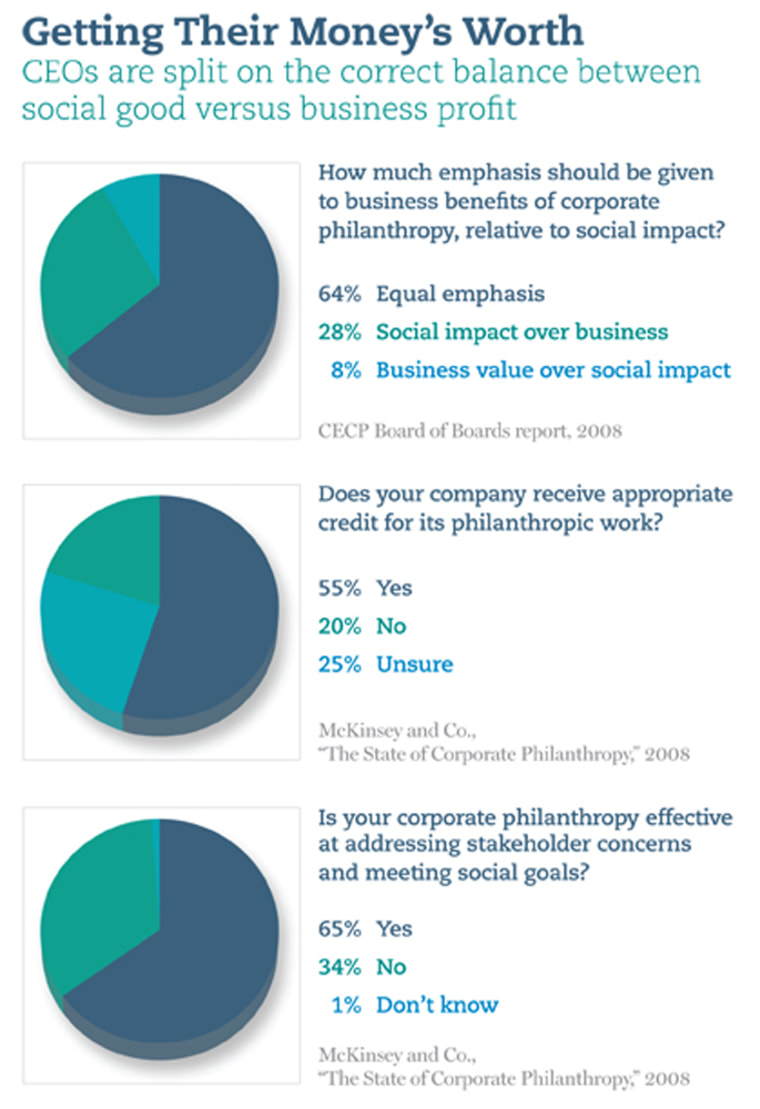
GARNIER: I agree. In our case, the issue of employee recruitment is particularly important. We try to recruit the best scientists in the world. Many of them are idealistic. They want to join a company that does much more than just meet financial guidelines every quarter. They want a company that has a human face, and philanthropy is that face. Shareholders get it. We invested last close to $600 million of our profits in philanthropy [in 2006], and I haven't had any criticism from them. They understand that philanthropy and reputation go together, and companies with good reputations make their shareholders rich.
HASSENFELD: The late economist Milton Friedman always said that the business of a company is the bottom line. But I think he'd agree that people really are looking at the softer side of a company now if they're going to invest in it.
Is there a Top Ten list of causes that are of particular interest to those you wish to recruit?
RYAN: No, I think it's pretty diversified. We use philanthropy to both encourage employees but also to get them committed back to us by supporting causes they back. But I'd like to add that I think more of us in business now believe that we can help solve some of these social problems. I, for example, have spent a lot of time in education, especially K-12, and for years, it was, well, You guys just want to recruit people who are automatons to go in and do what your company wants them to do. Virtually every survey we look at now says that the skills to be successful in higher education and the skills needed to be successful in business are identical. You need analytical skills and you need to understand technology—whether you work on the factory floor or whether you work in the marketing department. Business can do a lot more than simply give money or educate teachers and so forth. We can work to see results, and use those results to do even more.
As a nation, we've just entered what many say will become a protracted recession. Over the past year, how has the economic climate clouded corporate philanthropy? Will companies now give even less?
ROTH: Certainly given the concerns about the economy, everyone is looking very closely at various corporate programs. I don’t think you’ll see major cutbacks in the normal sustainable programs that corporations have been involved in, such as in our own industry's pro bono public service announcements, for example. But the spot contributions—the cash contributions—are the ones that I think companies might take a closer look at now, given the issues surrounding the economy.

HASSENFELD: I guess what I’m saying is that I'm passionate about philanthropy but not for some of the same reasons that maybe other people are.
How so?
HASSENFELD: First of all, I firmly believe that if you want to be part of the 21st century, you must be socially responsible or you won't exist. Because being corporately responsible, and giving, does a lot of incredible things for your company, but most importantly, it's also the right thing to do. All over the world, even in China, all the people are talking about corporate social responsibility. It's not so much philanthropy, but the overall package of CSR. And the reason for it has been the corruption, the greed, and corporations saying they care when, in fact, they can do a lot more to make a difference—like a company that can be very philanthropic but which can also be a terrible environmental polluter. Okay, are those kinds of companies good companies, or not?
FORRESTER: My company is Payne, Forrester, and were privately held and we have an advantage in that regard. We don't have to get up in front of shareholders and other people and explain ourselves. I've been in the philanthropic business for 37 years, and I actually started as a director of corporate relations in Hartford, Conn. The company had, at that time, close to 30 corporate headquarters, and they were enormously philanthropic because the chief executive took the leadership. But back in those days, the notion of one's community was different. Back then, you could actually see your community, you could walk down the streets of your community, and if you weren't participating in the community, then you were supporting somebody who did, someone you probably knew personally. Today, though, when you have 130,000, 200,000 employees spread around the world, it's much more difficult to know the impact of your philanthropic programs. Who are your shareholders? How do you really understand the impact of what you're doing? What I've seen more recently are companies applying philanthropic principles in much broader ways. They're doing it because of their employees, or because of their market positioning, or maybe to solve a problem specific to company interests. The companies that give, in other words, are being more strategic about it.
ROTH: My company, Interpublic, is in the business of branding and communications, and certainly we have clients who are looking to establish and enhance their brand. Clearly, the reputational aspects of a brand are critical in the market place. But philanthropic initiatives have to start from the top. If they don't come from the top, they're not going to permeate throughout the organization.


Should there be more public-private partnerships? Is it time to change the tax code to encourage more corporate giving? What about the idea of venture philanthropy, or the idea of creating global business coalitions to help tackle social problems in new markets overseas?
FORRESTER: The last thing that I'd want anybody to try to reinvent is the tax code. Please, stay away from that. Efforts to change the tax code, particularly when those efforts get near philanthropy, tend to make matters worse. I've been around this subject of philanthropy for so long, that I think I've become even boring to myself (laughter) but I believe issues like venture philanthropy have been around for a long time. Our great university hospital was built by business people, people who were venture philanthropists who were not only putting their money out but were putting their wisdom out, too. And, by the way, wisdom takes a long time to accumulate. It's not just that you get very wealthy. You also get wise.
Having said that, though, I'm all for new models, and I think we have to keep trying. The system is not broken. But the system needs people helping it, using their wisdom, using their resources. One of the wonderful things about corporations now that I see and I agree with Jean-Paul Garnier here is how they can look at a larger issue and bring both money and capacity to bear on a problem—their human resources, their expertise, their reach, and so forth. I'm not sure I even understand this new model of mixing philanthropy with the core business as part of a company's for-profit activity. I do know that in my experience, when philanthropy and business get too close, it doesn't work. When you're going out to raise venture money, the investor wants 25 percent. That's not philanthropy. There are, of course, program-related investments to which you can apply the sample principles of venture capital. But with philanthropy, you're investing at a different rate of return. The return may never actually be there.
MALKIN: I have a taxation background, so let me just comment on the tax code: I don't see anything wrong with it as is. Our Internal Revenue Code, as it's currently structured, helps nonprofit organizations, and in certain areas, it's necessary. Tax credits that are available for low-income housing, for example, are a very important aspect of creating housing for the poor. That's an example of how we can use the tax code to help a whole bunch of people as well as provide a return to those investors who utilize it. It's a lower return, but it's still a return.
How can businesses become more involved globally?
HASSENFELD: We have to begin to learn that our views on the rest of the world are not necessarily the right ones. We have a tendency to put our values and our culture, and our religious viewpoints, on other societies. That's where businesses can do a better job globally. We all have to learn to partner up. Who are the best people in each country to partner with in the discipline that we want to affect?
I think business has got to be proactive and not reactive in areas of their expertise. If we do things right in, let's say India or China, we're seeding our name for the future, and therefore, for the shareholder down the road. Business should, once in a while, get its hands dirty.
After Hurricane Katrina, there was a water company that went in and provided bottled water, and an express delivery firm that went in to help distribute it. Is there a need to formalize this, perhaps to create a kind of corporate SWAT team that could be deployed at a moment's notice to help victims of disasters?
HASSENFELD: Let me cite some interesting numbers. One year after the tsunami, we sent a team over to the areas that were ravaged and funded a study. And as of January 2006, a full 79 percent of the $13 billion raised to help victims hadn't been spent yet. Government, non-governmental organizations, and corporations all must work together. Each does something really well. Corporate tends to do well in logistics; NGOs know local needs really well, and so on. It's like if you're sending things to Pakistan because of the earthquake, you don't send ham. (laughter) Business groups should develop rapid deployment logistics teams and they should be formal and should be housed somewhere. And they should be made up of people who are able to interconnect on a global basis knowing, first of all, that there most certainly is going to be another natural disaster somewhere in the next six months. We live in a world now where there is going to be another disaster somewhere, ongoing, so let's mobilize now.
GARNIER: It's true that one thing that business should be considering is forming more coalitions. Instead of GSK doing one thing and Prudential doing something else, for example, there could be some very important opportunities here for collaboration. This isn't being done now, and I think that's the next chapter of effective philanthropy.
ROTH: What J.P. [Garnier] just said reminds me of your early meetings, Bob [Forrester], when Paul Newman was sitting in the room with Newman's Own, and he would look around and say, "Well, you business leaders are very efficient, you're very bright, you have a lot of resources. Why can't we put our resources together without having a hidden agenda of our own, in order to solve common problems in the world?"
HASSENFELD: I know we could do more. Too often, you know, especially in disasters, we tend to overreact too quickly. So we in business have to try to find a home for a rapid deployment crisis group that basically can say, okay, in Bangladesh, these are the goods, this is how we’re going to distribute them, this is how we’re going to work with the government and these are the companies, whether they're multinational or local, that have the following resources which can be utilized in an emergency. One of the things I don't like to see is when company A gives $100 million to this crisis, but what's company B and C going to do? And then once the money is given, how is it being deployed? There's often plenty of money on Day One, but not enough six months, a year, two years, and three years out. There is a lot of trauma that children go through that people don't hear about after the aid workers leave, the cameras leave, the newspaper reporters leave. How do you support the kids after everybody has left?

What about China, obviously a huge market? How well can this uniquely American notion of philanthropy translate to places where the concept isn't always shared by authorities nor fully understood?
FORRESTER: I don't think nonprofits are legal in China. But if a country is going to be competitive in the global market, ultimately, it's going to have to have a third sector in it.
RYAN: In China, it's a very small group of very wealthy individuals who are doing things, some of them who've come back from being schooled in the United States and who are, perhaps, ingratiating themselves with the government to create things for the public good. But I think corporate philanthropy, as we know it, will take many, many, years to develop in a place like China because of its history and culture—but that doesn't mean it can't happen, or won't.
One last question. It's about governance. Some nonprofit boards more resemble social groups than tough watchdogs over a charity's finances and strategies. Can the for-profit world help charities become better stewards of donor dollars?
FORRESTER: There are certain nonprofits that were started as advocacy groups that took a position that business people (give bad advice), so that's a hard one.
GARNIER: I want my director boards to be active in some nonprofit capacity because it opens their world a little bit. I was touring with someone from the Children's Health Fund here in New York. They provide medical services to runaways in bad parts of the city. I can tell you, a day like this changes you. It's good. People who have enormous responsibilities for thousands of people in a corporation also should have a humanistic dimension to them. They should be open to the world, and they shouldn't live in their ivory towers. Getting out there with a nonprofit is as good as it gets in terms of getting managers to see the realities of the world in which we live. So I think it's a win-win.
